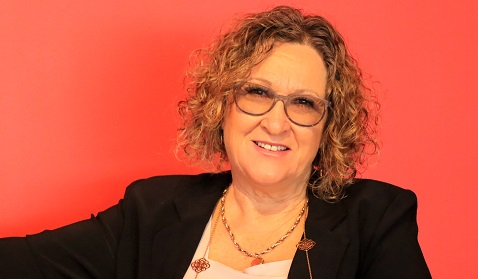Born in Wales, Sharon Tapscott emigrated to Australia with her family and grew in the shadow of the Dandenong Ranges, not far from Melbourne. She moved to Merimbula in NSW with her husband in 1985, where they ran a series of small businesses.
She became active in local politics during a campaign to save the Pambula Hospital, and was elected to the Bega Valley Shire Council in 2012, becoming mayor in May this year.
Q: What does your typical mayoral working day look like?
Well, as a mayor in a shire that has endured multiple crises in recent years, my working day varies. Sometimes I might start off with a meeting with the Cross-Border Commissioner and sometimes the Commissioner for Police on the Covid-19 issue. Or I might do some outreach and catch up with some bushfire-affected communities.
I was in the office all day yesterday; we had a five-and-a-half-hour meeting. Each day brings something new, so I do not really have a typical day.
It just depends on where I want to go and who needs me the most.
Q: What is the best aspect of your job?
Meeting with committee is absolutely the best part of my job.
I have just come back from a little town called Wyndham catching up with people who are still in recovery. I know a lot of them personally and it is great to have a chat with them because many of them are in a less-than-ideal situation.
We have got very different communities along our seaboard and out into the hinterland and that diversity is another rewarding aspect of the job.
Q: What is the worst aspect of your job?
Chairing a council meeting on the budget for the year – and trying to keep some semblance of order so we can achieve a result at the end – would have to be the worst job that anybody could ever have!
Q: What is the most rewarding project you have worked on during your time in local government?
When I first come to Council, which was about eight years ago, it was about infrastructure and the things that our community needed, like safe parks and play areas and swimming pools, and keeping them up to standard.
But since we have had the three fires here, and floods, it is about meeting with resilient people and helping them to get through their recovery process the best way they can.
Q: Your council is among the many that bore the brunt of the Black Summer bushfires. What are the lessons, looking ahead, for disaster preparedness and mitigation at the local level?
It is difficult to say how we could prepare better given that we now seem in to living in a new “environmental normal”. We found that the gabions [cages filled with rocks] we use for roadmaking and erosion control throughout the shire just melted when the bushfires swept through in January. Who would have thought?
We have to acknowledge the reality of a new normal and develop a different mindset.
Q: The coronavirus pandemic has created serious financial headaches for councils. What can be done longer-term to ensure local government funding is adequate to provide the services residents, businesses and communities expect?
Funding for a rural shire is very different than it is for a metropolitan council. FAGs grants are exceptionally important for us, and we need that to be reinstated to its original percentage level. We’ve lost funding, especially with the indexation freeze.
FAGs constitute a greater percentage of our financial viability in the rural areas and I think that needs to be looked at. I think there needs to be two different levels for funding through FAGs grants.
A lot of our grants have required co-contribution and that can be problematic too. We need to have stimulus here in Bega Valley; we cannot be contracting. So we have to be very careful with the management and the timelines of our budget.
Q: If someone standing for council were to ask you for advice, how would you respond?
I would say you have to listen to your community. Don’t go in thinking that you’re going to change the world because your view of the world might not be what your community wants. So listen to your community and be directed by them.
Be prepared to attend lots of meetings and be prepared to never have a minute’s peace.
And the other thing is to when you get on the phone, just put a smile on your face. It will show in your voice, even at 8.30 on a Sunday night.
Q: What is your favourite place, and why?
My favourite place is probably a little spot called Lochiel in the hinterland of the Shire where my husband and I have our families.
We don’t live there anymore. We have downsized to another beautiful place called Merimbula, but Lochiel is where my family is and where I like to be.
Q: How would you reflect on the difference that you’ve made in your community and local government in general?
I suppose that is for somebody else to really reflect upon. I just want to see the things that we started finished, or consolidated.
One of the big projects I want to see completed is sealing a very long piece of road out in the hinterland. It’s a school bus route so a lot of kids travel that road.
It has taken eight years of constant wrangling to get it underway and it will be done by the time I leave council, which is great.



